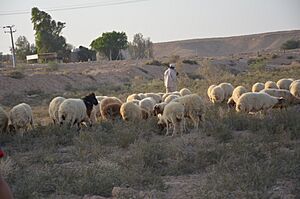Identity (social science) facts for kids
Identity is how we see ourselves and how others see us. It includes our beliefs, personality, looks, and how we express ourselves. It's what makes a person or a group unique.
Our identity starts forming when we are young. It keeps changing and growing throughout our lives. Things like our family, friends, and culture help shape who we are. The word "identity" comes from a Latin word meaning "sameness." It helps us understand how we are similar to others and also how we are special.
Identity helps us understand ourselves. It gives us a sense of purpose and helps us set goals for the future. It also helps us deal with life changes and feel good about ourselves. But remember, some parts of our identity, like our family background or where we come from, are things we don't choose.
In sociology, which is the study of how people live in groups, identity is often about our roles. For example, a "father" acts like a father, and a "nurse" acts like a nurse. Our group memberships also help define who we are.
In psychology, which is the study of the mind, identity usually means our personal identity. These are the special qualities that make each person different. Our identity is closely linked to our self-concept (how we think about ourselves) and our self-esteem (how much we value ourselves). Even though our identity can change, it often feels like a stable part of who we are.
Contents
Identity in Psychology

Erik Erikson was an important psychologist who studied identity. He talked about "ego identity," which is our personal feeling of being the same person over time. He believed this feeling develops throughout our lives. Our ego identity includes our own traits and how social and cultural things affect us.
Erikson described eight stages of life, each with a challenge. The main identity challenge happens during our teenage years. How we handle this challenge affects our identity.
- If someone doesn't figure out who they are, they might have "identity diffusion." This means they are unsure about their identity.
- If someone just accepts the identity given to them without thinking about it, they have a "foreclosed" identity.
- Having a strong ego identity and fitting into society can lead to a stronger sense of self. If these are missing, it might lead to an identity crisis.
Exploring Your Identity
Later, another psychologist named James Marcia built on Erikson's ideas. He focused on two main things: exploration and commitment.
- Exploration means trying out different ideas, beliefs, and roles.
- Commitment means deciding on certain beliefs or roles.
Marcia described four ways people deal with identity:
- Identity Diffusion: A person avoids exploring options and doesn't commit to an identity. They might feel lost or uncaring about who they are.
- Identity Foreclosure: A person commits to an identity without exploring other choices. This might happen if they just follow what their parents or community expect.
- Identity Moratorium: A person is actively exploring different options but hasn't committed to one yet. They are still figuring things out.
- Identity Achievement: A person has explored many possibilities and has made a clear commitment to their identity. They know who they are and what they believe.
How We See Ourselves
Even though identity and "self" are different, understanding the "self" helps us understand identity. The "self" includes how we form our thoughts about ourselves and the actual ideas we have about who we are. Psychologists look at how our self-concept affects our self-esteem and how we organize what we know about ourselves.
Identity in Social Psychology
Social psychology looks at how our personal self connects with the world around us. It tries to understand how individuals act within groups and how groups affect individuals.
Group Identity
Being part of a group can make people feel good about themselves and give them a sense of belonging. Researchers also study why people sometimes favor their "in-group" (people like them) over "out-groups" (people who are different). Even small differences between groups can change how people see each other.
Different social situations can make people connect with different parts of their identity. This might make some people feel left out or cause them to switch between groups. It can also lead to a difference between who people want to be (their ideal self) and how others see them. Our education and jobs can really shape our identity.
Identity in Anthropology
Anthropologists study human societies and cultures. They use the term "identity" to talk about what makes a person unique. They also look at how identity connects a person to a group. This became more important in the 1970s when people started focusing on ethnicity and social movements.
There are two main ways anthropologists have looked at identity:
- Fixed Identity: This idea says identity is set by things like family history or shared physical traits. It's seen as something you are born with.
- Changing Identity: This idea says identity is shaped by choices and social situations. It's not something fixed, but something that can change.
Both ideas have been important in discussions about class, race, and ethnicity. It's hard to define identity because it's not something you can easily see or touch. It can feel stable, but it's also very fluid and can change. Some experts even suggest using different words, like "identification," to show that identity is made up of different parts that individuals choose and interpret.
Identity Markers
Identity is often shown through "markers." These are things like the language we speak, the clothes we wear, our behaviour, or the places we choose to be. These markers help create "boundaries" that show similarities or differences between people. For these markers to work, people need to understand what they mean. Sometimes, misunderstandings happen if people interpret markers differently.
Boundaries can be:
- Exclusive: When a marker limits how others can act. For example, speaking a language that only some people understand might make others feel left out.
- Inclusive: When a marker helps people connect. For example, speaking a language that others understand can bring people together. But even inclusive boundaries can limit who else you connect with.
Identity and Religion
A religious identity includes the beliefs and practices a person follows. It often involves traditions, stories, and faith. This identity usually starts with a person's family religion. As they grow up, they might choose to keep the same religion or choose a different one.
The Parable of the Lost Sheep is a story from the Bible. It's about a shepherd who leaves 99 sheep to find one lost sheep. This story shows how important it is to find what is lost, and it can be seen as a way to understand the rediscovery of identity.
In Western cultures, personal identity has been greatly shaped by Christianity. Many thinkers who helped develop European identity were influenced by Greek and Jewish cultures.
How Identity Affects Our Lives
Identity is important because it helps us understand ourselves, control our lives, find meaning, and set goals. Because of this, identity touches many parts of our lives.
Identity Changes
Our identity can change in different situations:
- Career Change: When someone changes jobs, they might need to redefine who they are in their new work role.
- Gender Identity Transition: People who feel their inner sense of gender doesn't match the gender they were assigned at birth might go through a process to live as their true gender. This involves big personal and social changes.
- Moving to a New Country: When people move, they adapt to new customs. This can change their cultural, social, and work identities.
- Adoption: Being adopted can lead to exploring different family connections and understanding how adoption shapes one's self-identity.
- Illness: Getting sick can change how a person sees themselves. It might also affect their ability to work, which can change their work identity.
Immigration and Identity
Moving to a new country often changes a person's social identity. How much it changes depends on how different their old culture is from the new one. If a person has a strong personal identity, it can help them feel stable during these changes.
Work and Identity
Our jobs and activities are a big part of our identity. This includes careers, volunteering, sports, or caring for others. If someone can't do meaningful activities, like because of an illness, it can affect their identity. Feeling unproductive can harm one's social identity.
Our work helps shape who we are, and who we are helps us choose our work. People want to feel in control of their jobs and avoid negative labels.
Dealing with Stigma in Work
Sometimes, jobs have a bad reputation or "stigma." People might choose jobs based on this stigma, or they might try to explain why their job is important. Things like job satisfaction and quality of life are important. It can be hard to feel good about yourself if society sees your work as "dirty" or unwanted.
Some people choose not to let their job define their whole identity. They want to be seen as more than just their work. But if someone's identity is strongly linked to their job, they might have a crisis if they can no longer do that work. So, our work identity needs to be flexible and able to adapt to changes.
What Shapes Our Identity
The idea of personal identity as something unique has changed over time. Several things have made us focus more on personal identity:
- Protestant Influence: In Western countries, the Protestant tradition stressed that individuals are responsible for their own spiritual well-being. This led to more focus on personal identity.
- Rise of Psychology: When psychology became a field of study in the 1800s, it helped us understand identity better.
- More Privacy: During the Renaissance, people started valuing privacy more, which made individual identities more important.
- Specialized Work: In the industrial age, jobs became more specialized. This changed how people saw themselves through their work.
- Gender Identity: There's more focus now on gender identity, including topics like gender dysphoria and transgender experiences. This helps us understand many different identities.
- Mental Health: Understanding identity problems is important for understanding mental health.
See also
 In Spanish: Identidad (ciencias sociales) para niños
In Spanish: Identidad (ciencias sociales) para niños
- International Identity Federation
- Online identity
- Passing
- Role engulfment
- Self-consciousness
- Self-discovery


